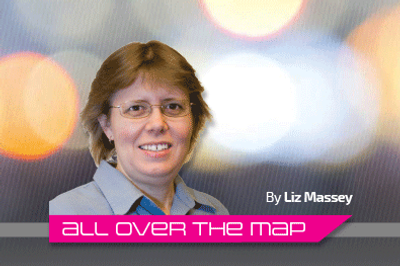By Liz Massey, Nov. 20, 2014.
One of the great lies told by those who resist LGBT equality, and American social reform movements in general, is that the legal and social “playing field” on which we live our lives is already level. Those of us who are LGBT are well aware this is not the case.
Social inequality is often expressed through dollars and cents and is reinforced by discriminatory laws. Our financial well-being has been threatened by a lack of inclusion in federal employment discrimination laws; by inheritance laws that, before the Windsor case in 2013, kept us from accessing our spouse’s assets after death without paying a heavy tax penalty; and by prejudicial grant allocation, which keeps funds away from artists and social reformers doing great work, simply because the granting agency does not like the fact that the grant-seeker is openly gay or trans.
Our civil equality movement is working hard at the ballot box and in the courts to erase the financial “punishment” that often results from coming out. Another way in which this discrepancy is being addressed is through new funding strategies that subvert the old order of things.
Crowdfunding, in particular, holds great promise as a way to make everyone — LGBT people included — less dependent on the approval and favor of the “one percent,” and more trusting of the generosity and camaraderie of the 99 percent.
Crowdfunding has its origins in activities as old as rent parties and passing the hat to support a friend. Throughout the past decade, it’s become very big business: Crowdfunding platforms financed $2.7 billion in projects in 2012, and are poised to surpass the size of the current global investment market by 2025.
Two of the most popular funding platforms in the United States — Kickstarter and IndieGoGo — provide cash for creative projects, but the concept is being used to fund civic initiatives through sites like Neighbor.ly, and to provide loans to people wanting to convert their residences and buildings to solar power through the Mosaic platform.
LGBT projects are everywhere on crowdfunding sites. Director Jerry Schwarz was able to partially fund his documentary of Harris Glenn Milstead, I Am Divine, with an IndieGoGo campaign that netted more than $38,000. Queer-themed films, children’s books, even dance performances with gay themes have been the subject of recent crowdfunding initiatives.
Traditionally, during the last two months of the year, there is a heavy emphasis on giving. We’re encouraged to think beyond the narrow confines of our personal lives and interests and reach out to help others.
For LGBT persons and their allies, getting involved with crowdfunding, either as one seeking funding or as someone seeking to give money to a good cause, is a great chance to “pay it forward.”
Here are just a few reasons why crowdfunding could build a better LGBT community if we embraced it wholeheartedly.
• It cuts through institutional bias.
Although we’ve made progress in making corporations, nonprofits and government institutions more friendly to LGBT needs and projects, much work remains to be done. Crowdfunding circumvents prejudice and takes the seeker’s proposal directly to those most likely to be supportive of it.
• It allows seekers to “test” new ideas.
Not every project idea will gain popular traction, no matter how good it sounds in theory. Since it costs very little to set up a crowdfunding campaign, it’s easy for a seeker to set up several proposals and see which one attracts the greatest interest and the most cash.
• It connects queer artists/entrepreneurs/social reformers directly with their audience.
Before an artist, business or organization can claim to have “raving fans,” it needs to know the needs of those fans on an intimate level. Creating incentive items for donors (including one-on-one time with them or other individualized treats) can help the seeker understand what their supporters want and need from them.
• It promotes a feeling of togetherness and empowerment.
It’s great to have experts picking the stocks in your retirement portfolio, but when you invest/donate money through a crowdfunding campaign, there’s a delicious sense of clarity that comes from knowing exactly what you’re helping to create. And those conducting a crowdfunding campaign can feel the sense of empowerment that comes from knowing they can find support from ordinary people all around them.
Crowdfunding is a great way for us to create an appealing LGBT future in which we want to live. While we’re making significant strides in restructuring mainstream society to allow LGBT people to access the funding they need to achieve their dreams, we don’t have to wait for our full legal equality to make important projects happen.
As the old saying goes, “You get what you pay for.”
If we aren’t willing to invest in bringing about a queer-friendly culture that provides the books, arts, music, clothes and social services that meet our unique needs, how can we expect anyone else to do the same?
